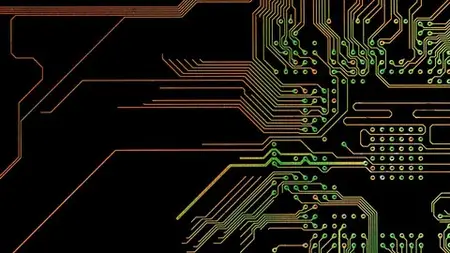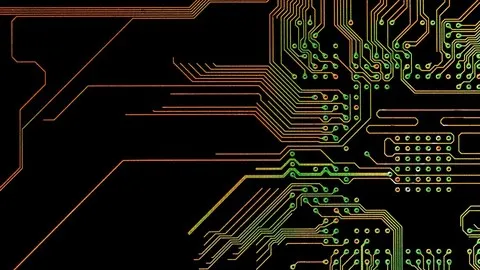Mastering Express Pcb: From Schematics To Final Pcb Design
Published 12/2024
MP4 | Video: h264, 1920x1080 | Audio: AAC, 44.1 KHz
Language: English | Size: 10.87 GB | Duration: 13h 56m
Published 12/2024
MP4 | Video: h264, 1920x1080 | Audio: AAC, 44.1 KHz
Language: English | Size: 10.87 GB | Duration: 13h 56m
Unlock the power of Express PCB to design, simulate, and create professional PCBs with ease.
What you'll learn
Navigate and utilize the Express PCB interface effectively.
Create and troubleshoot schematic diagrams.
Design PCBs for practical applications like temperature indicators and breath analyzers.
Develop custom components and manage libraries.
Address netlist errors and refine PCB layouts for professional results.
Requirements
A basic understanding of electronics and circuit components. A computer with Express PCB software installed. Interest in PCB design and development.
Description
Express PCB is a powerful tool for designing schematic diagrams and printed circuit boards (PCBs). This course, "Mastering Express PCB," equips learners with the knowledge to navigate the software, design complex circuits, and bring their PCB ideas to life. The course covers interface navigation, schematic creation, custom component design, and practical projects like digital temperature indicators and alcohol breath analyzers.Section-Wise WriteupSection 1: IntroductionThis section introduces the course and highlights the capabilities of Express PCB, setting the stage for learners to explore its interface and tools.Section 2: Express PCB InterfaceLearners are guided through the user interface, including side toolbars and project organization. The section also covers component arrangement, symbol usage, and creating a basic schematic.Section 3: Connecting Other ComponentsThis section focuses on the step-by-step process of connecting circuit components, troubleshooting netlist errors, and ensuring circuit functionality through proper pin and ground terminal connections.Section 4: Projects: Digital Temperature Indicator SchematicLearners create a digital temperature indicator schematic, diving into custom component design, pin configurations, library usage, and schematic validation through netlist checks.Section 5: ToolbarThe toolbar functionalities of Express PCB are explored in detail, with practical demonstrations to solidify understanding.Section 6: Digital Temperature Indicator - PCB DesignBuilding on the schematic, this section transitions to PCB design. Learners will design the layout, configure components, and implement connections for the digital temperature indicator.Section 7: Digital Temperature Indicator Custom Component CreationStudents learn advanced techniques like creating custom components, setting power traces, and finalizing PCB designs.Section 8: Alcohol Breath Analyzer SchematicThis section introduces a second project: designing an alcohol breath analyzer. Topics include custom component creation, sensor integration, seven-segment display connections, and schematic finalization.Section 9: Parked Vehicle Highway FlasherLearners will work on a parked vehicle highway flasher, covering rerouting, netlist checks, and silk layer configurations for enhanced design clarity.Section 10: Alcohol Breath Analyzer PCB DesignThe course culminates with the PCB design for the alcohol breath analyzer, covering multi-layer PCB techniques, copper layers, pad properties, and connection troubleshooting.Section 11: ConclusionThe course concludes with a summary of the skills acquired and an emphasis on applying these techniques to real-world PCB design projects.
Overview
Section 1: Introduction
Lecture 1 Introduction to Express PCB
Section 2: Express PCB Interface
Lecture 2 Understanding the Interface
Lecture 3 Side Toolbars
Lecture 4 Understanding the Projects
Lecture 5 Components and Symbols
Lecture 6 Arranging the Components
Lecture 7 Variable Resistor
Section 3: Connecting Other Components
Lecture 8 Connecting the Pins
Lecture 9 Netlist Errors
Lecture 10 Connecting Diode
Lecture 11 Inserting the Transistors
Lecture 12 Inserting Text in Circuit Diagram
Lecture 13 Space Bar
Lecture 14 Ground Terminal
Lecture 15 Detail Fill
Lecture 16 Continues Netlist Error
Lecture 17 Checking of Netlist Error
Section 4: Projects Digital Temperature Indicator Schematic
Lecture 18 Digital Temperature Indicator
Lecture 19 Creating Custom Component
Lecture 20 LCD Display Pin Configuration
Lecture 21 Creating Custom Component out of Buzzer
Lecture 22 Schematic Drawing
Lecture 23 Digital Temperature Indicator Ground Terminal
Lecture 24 Library Symbols - Power Ground
Lecture 25 Check Schematic for Netlist Errors
Lecture 26 Check Schematic for Netlist Errors Continue
Section 5: Toolbar
Lecture 27 How to Use Express PCB
Lecture 28 Side Toolbar With Practical's
Lecture 29 More Details on Express PCB
Section 6: Digital temperature indicator - PCB Design
Lecture 30 Digital Temperature Indicator - PCB Design
Lecture 31 Connector 16 Pin Ribbon (Digikey)
Lecture 32 Transistor
Lecture 33 Placing the Pats and Eases
Lecture 34 Micro Controller
Lecture 35 Buzzer Connectivity and Switcher Connectivity
Section 7: Digital Temperature Indicator Customer Comp Create
Lecture 36 Digital Temperature Indicator Customer comp Create
Lecture 37 3 Pin Button Use
Lecture 38 Power Trace
Lecture 39 Insert Buzzer
Lecture 40 Checking Netlist
Lecture 41 PCB Design
Lecture 42 Final PCB Design
Section 8: Alcohol Breath Analyzer Schematic
Lecture 43 Alcohol Breath Analyzer Schematic
Lecture 44 Integrated Circuits
Lecture 45 Custom Component
Lecture 46 Pin Configuration - Diagram
Lecture 47 ADC Convert
Lecture 48 Arrange the Micro Controller
Lecture 49 Passive Register
Lecture 50 The Creation of Custom Components
Lecture 51 Common Cathode
Lecture 52 Three Register
Lecture 53 Renaming the Components
Lecture 54 Alcohol Sensor
Lecture 55 Create Alcohol Sensor
Lecture 56 Save the Custom Components
Lecture 57 Alcohol Breath Analyzer Ground Terminal
Lecture 58 Placing Wire
Lecture 59 Seven Segment Display Connection
Lecture 60 Connecting Switch
Lecture 61 Connection C2
Lecture 62 There are Three Single Digit Seven Segment Display
Lecture 63 Creating Directly 3 Digit Display
Lecture 64 Cross Connectivity
Lecture 65 Remove the 3 Other Slides
Lecture 66 Placing the PCB
Section 9: Parked Vehicle Highway Flasher
Lecture 67 Parked Vehicle Highway Flasher
Lecture 68 Silk Since Layer
Lecture 69 Silk Since Layer Continue
Lecture 70 Cathode Connected by R8
Lecture 71 Cathode Connected the Power
Lecture 72 Rerouting
Lecture 73 Checking Netlist Rerouting
Lecture 74 Last Part Placing the Components
Lecture 75 Checking Part of the Circuit
Lecture 76 Insert 2 Point Battery
Lecture 77 Connecting to the S1 Switch
Section 10: Alcohol Breath Analyzer PCB Design
Lecture 78 Alcohol Breath Analyzer
Lecture 79 Text Orientation
Lecture 80 Placing the Components
Lecture 81 Top and Bottom Copper Layer
Lecture 82 Set Properties of the Selected Pad
Lecture 83 Default Choosing 0.125walt
Lecture 84 Connection for the Switch
Lecture 85 Connection for the Switch with Power Trace
Lecture 86 Which Number Register of the Resolve
Lecture 87 Continue the Unfinished Design
Lecture 88 Placing the Trace
Lecture 89 Change the Power Trace
Lecture 90 Serious Connection
Lecture 91 D1 will Connected with the Set Up Pin
Lecture 92 Connecting Pins
Lecture 93 Un Group the Component
Lecture 94 3 Pins Connected to the Ground Terminal
Lecture 95 Internal Connections of 3 Digit
Section 11: Conclusion
Lecture 96 Conclusion Express SCH and Express PCB
Electronics enthusiasts and hobbyists. Engineering students and professionals in electronics or electrical fields. Individuals looking to master PCB design tools. Anyone interested in translating circuit ideas into functional PCBs.



